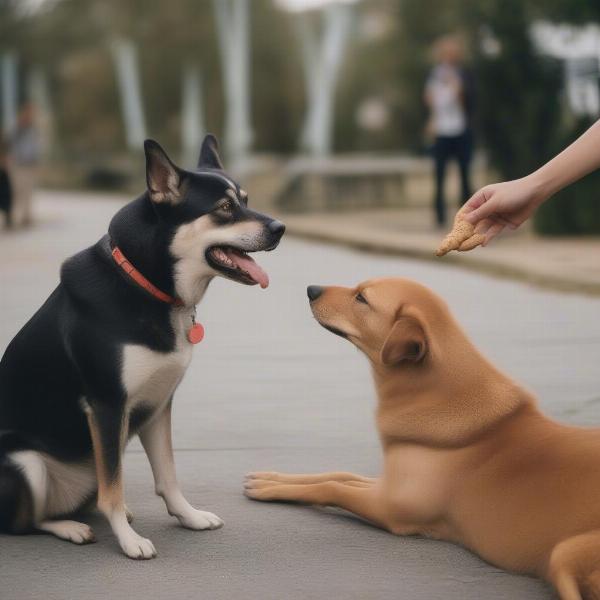The question “why is my dog racist?” is a complex one, often stemming from a dog’s seemingly aggressive or fearful reactions to certain groups of people. While the term “racist” might seem applicable, dogs don’t experience prejudice in the same way humans do. It’s crucial to understand that dogs react based on learned associations, past experiences, and socialization, not inherent racial bias. This article will delve into the reasons behind these behaviors, offering practical solutions for fostering positive interactions and ensuring your dog is a well-adjusted member of society.
Is it Racism or Something Else? Decoding Your Dog’s Behavior
Dogs perceive the world differently than humans. Their reliance on scent, body language, and visual cues significantly influences their reactions. What might appear as racial bias is often a response to unfamiliar appearances, clothing, or even scents associated with specific groups. Perhaps your dog has had limited exposure to people of certain ethnicities, leading to anxiety or fear. Alternatively, a negative past experience with someone fitting a particular profile can create a negative association.
The Power of Socialization: Shaping a Well-Adjusted Dog
Early socialization is paramount in shaping a dog’s behavior. Exposing puppies to diverse people, environments, and situations helps them develop confidence and adapt to new experiences. A well-socialized dog is less likely to exhibit fear or aggression towards unfamiliar individuals, regardless of their race or appearance. Consistent positive reinforcement during these interactions solidifies positive associations.
Fear vs. Aggression: Identifying the Root Cause
Distinguishing between fear and aggression is crucial for addressing your dog’s behavior. Fear often manifests as cowering, hiding, or attempting to escape. Aggression, on the other hand, may involve barking, growling, lunging, or snapping. Understanding the underlying emotion helps tailor appropriate training and desensitization techniques.
“Fear is often misconstrued as aggression,” says certified dog trainer, Amelia Hernandez. “A thorough assessment of the dog’s body language is essential to determine the root of the behavior.”
Practical Steps for Addressing Biased Behavior
If your dog exhibits fear or aggression towards certain individuals, here are some practical steps to address the issue:
- Gradual desensitization: Slowly introduce your dog to the stimuli that trigger the negative reaction, starting at a safe distance and rewarding calm behavior.
- Positive reinforcement: Reward your dog for positive interactions with diverse people, using treats, praise, and toys.
- Counter-conditioning: Pair the presence of the triggering stimuli with something positive, such as a favorite treat or toy, to create a positive association.
- Professional guidance: If the behavior persists, consult a certified dog trainer or behaviorist experienced in addressing fear and aggression.
Building Bridges: Fostering Positive Interactions
Creating positive interactions is crucial for overcoming your dog’s biased behavior. Enlist the help of friends and family members who represent the group your dog reacts negatively to. Ask them to approach slowly, avoid direct eye contact initially, and offer treats. This helps your dog associate these individuals with positive experiences.
 Dog Interacting with Diverse People
Dog Interacting with Diverse People
“Patience and consistency are key,” advises Dr. David Lee, a veterinary behaviorist. “Building positive associations takes time and effort, but the rewards are immeasurable.”
Conclusion: Nurturing a Socially Adjusted Canine Companion
Addressing the perception of racism in dogs requires understanding their behavior, promoting positive socialization, and implementing appropriate training techniques. While the term “racist” might be inaccurate, addressing these behaviors ensures your dog becomes a well-adjusted and welcoming member of the community. Remember, with patience, consistency, and professional guidance if needed, you can help your dog overcome their anxieties and embrace a world of diversity.
FAQ
- Can dogs be truly racist? No, dogs don’t understand race or hold prejudiced beliefs like humans. Their reactions are based on learned associations and experiences.
- How can I socialize my puppy to different ethnicities? Expose your puppy to a wide range of people from different backgrounds, ensuring positive interactions through treats and praise.
- What should I do if my dog barks at people of a specific race? Consult a certified dog trainer or behaviorist for guidance on desensitization and counter-conditioning techniques.
- Is it too late to socialize an older dog? No, it’s never too late to socialize a dog, although it may require more patience and effort.
- Why is my dog suddenly reacting negatively to certain people? A negative past experience can trigger fear or aggression. Consult a professional to address the underlying issue.
- Can medications help with my dog’s fear or aggression? In some cases, medication can be used in conjunction with behavior modification techniques. Consult your veterinarian.
- How can I prevent my dog from developing biased behaviors? Early and consistent socialization is the best way to prevent your dog from developing fear or aggression towards specific groups of people.
Suggested Further Reading on ILM Dog
ILM Dog is your trusted resource for expert advice on dog care and training. We offer comprehensive information on dog breeds, health, behavior, nutrition, and much more. Whether you’re a new dog owner or a seasoned expert, ILM Dog is here to help you navigate every aspect of dog ownership. Contact us today for personalized support! Email: [email protected], Phone: +44 20-3965-8624. Visit us at ILM Dog for more information.